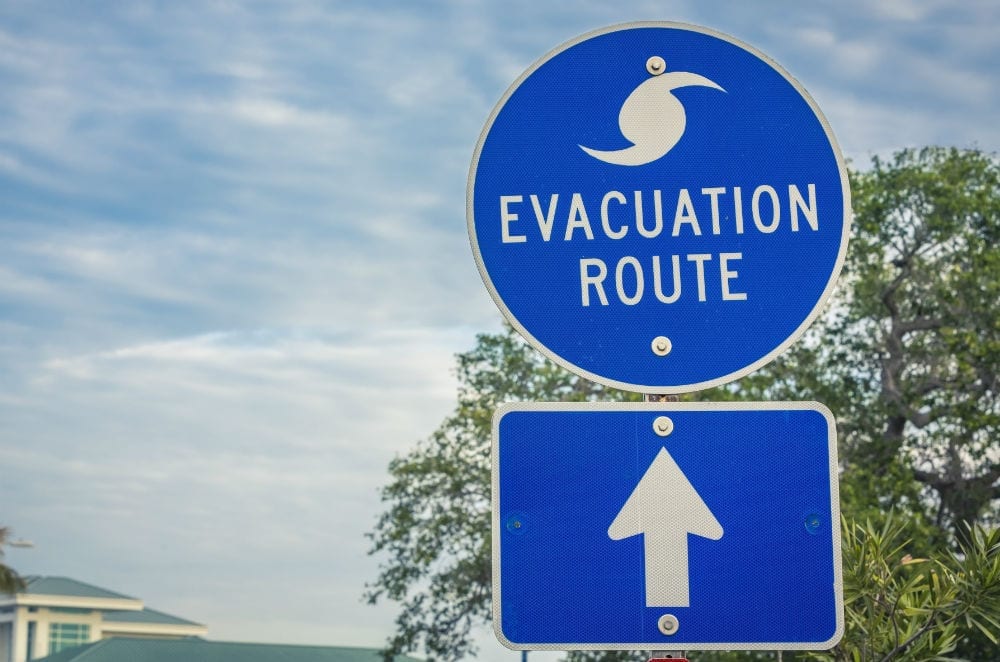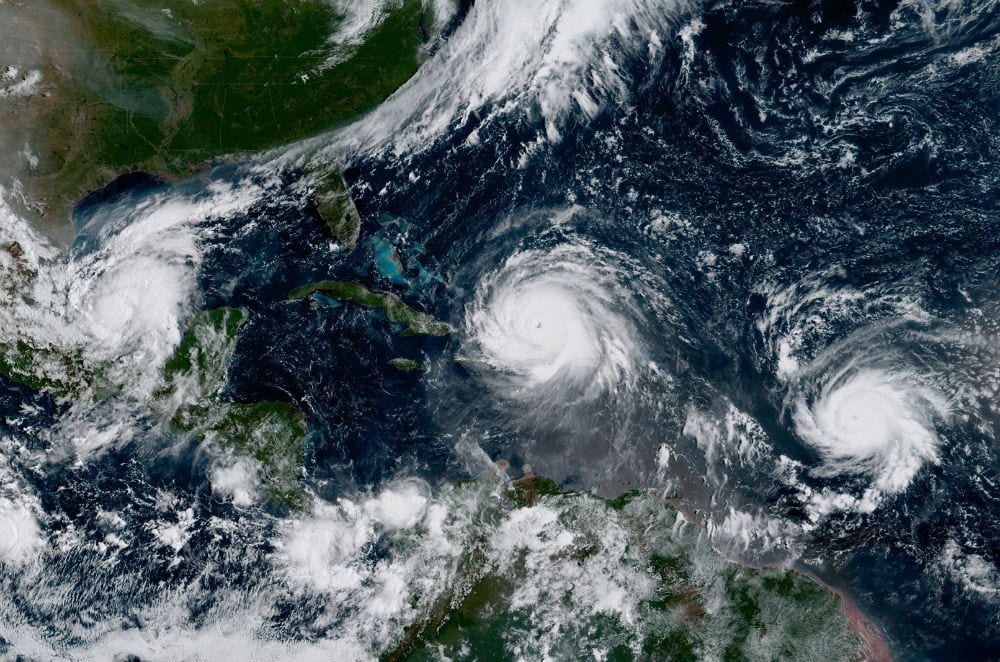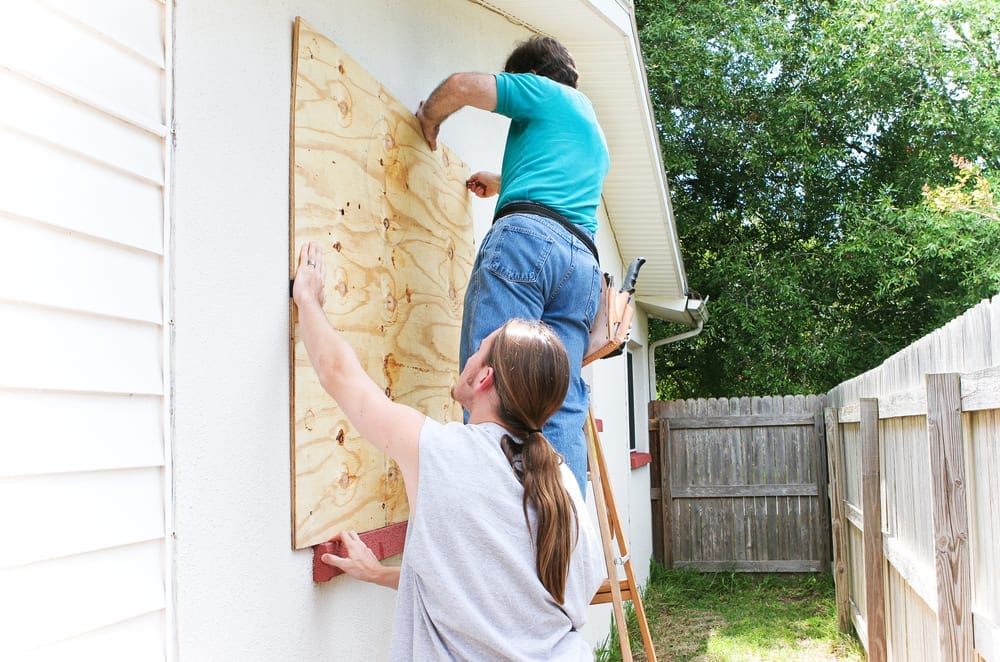The Atlantic hurricane season runs from June 1 to November 30, with most storm activity in mid-August to late October. If you live in an area prone to hurricanes or tropical storms, you should create and review a hurricane preparedness guide each season to prevent damage and keep your family safe. From how to prepare for a hurricane to ways of limiting damage to your home, we cover the steps you need to prevent hurricane damage before the peak season starts.
How to Prepare for a Hurricane
The best time to begin preparing for a hurricane is before hurricane season begins. This ensures that you are ready to take action when necessary.
- Create an Evacuation Plan – Create a comprehensive evacuation plan that includes multiple evacuation destinations as well as an emergency pack list. This ensures you can leave quickly and safely.
- Stock Up on Emergency Supplies – There is usually a rush for supplies as a storm approaches, so it’s better to stock up on emergency supplies in advance. Have plenty of non-perishable food, batteries, and water on hand.
- Inventory Your Home and Possessions – You should do a complete inventory of your home before each hurricane season. This will help speed up the insurance claims process and is also helpful if you need to apply for disaster aid.
- Review Your Insurance Policy – You should review your insurance policy at least once a year so you understand what is covered. This allows you to make changes to your policy prior to hurricane season or to add special flood or hurricane coverage.
- Protect and Secure Your Property – Whether you are evacuating or staying in your home for the storm, you should always protect and secure your property. Cover windows with shutters or marine-grade plywood to prevent or limit the damage.

1. How to Create a Hurricane Evacuation Plan
One of the most important parts of any hurricane preparedness guide is the evacuation plan. While you might not need to evacuate for every hurricane or tropical storm, it’s best to have a plan ready in case you need to leave quickly.
Identify Multiple Destinations
It’s best to pick at least two different destinations should you need to evacuate during a hurricane. These locations should be in opposite directions and outside of areas prone to hurricanes. This ensures you have options depending on the path of the hurricane. Additionally, locate hurricane shelters within your area in case you cannot leave the area.
Pack a Bag of Essentials in Advance
You should pack a bag of essential items in advance of hurricane season to ensure you can leave quickly. Include a couple of days worth of clothes, personal hygiene items, and a first aid kit. If possible, also pack an extra phone charger, batteries, radio, and a flashlight. Having this bag ready to go will make leaving your home easier and gives you more time to evacuate when necessary.
Create a Checklist of Supplies, Documents, and Medicines
You won’t be able to pack all the necessary items in advance, so create a checklist for those things. Whenever possible, keep as many items grouped together to speed up packing if an evacuation order is given.
- Prescriptions and other medicines
- Bottled water
- Non-perishable food
- Pet food and other items for your pets
- Flashlights – At least 1 flashlight per person
- Battery-powered radio
- Extra batteries – enough for 2 changes for each flashlight and radio
- Sleeping bags or blankets
- Pillows
- Comfort items like favorite toys
- Cell phone charger – 1 for each cell phone
- Computers
- Cherished possessions or heirlooms
- Special items for infants or elderly family members
- Birth and marriage certificates
- Personal identification like drivers licenses and passports
- Social Security cards
- Insurance policies and contact information for your agent
- Financial documents like bank statements, stocks, and bonds
- Mortgage documents or deeds
- Wills
- Recent tax returns
- Your home inventory list
Consider choosing a flashlight and radio that use the same size batteries. This will help you save time and space when packing. While rechargeable batteries are better for the environment, they can lose their charge over time. For that reason, consider using single-use batteries that hold their charge better in the long run.
Practice Evacuation Drills at Least Once Each Hurricane Season
Make sure that your entire family is aware of the evacuation plan and knows what to do in the event of a storm. Have a hurricane evacuation drill at least once each season and more often if you have young children or elderly family members.
Inform Family and Friends of Your Plans
Once you create your evacuation plan, share the details with family and friends. When possible, choose a trusted friend or family member who does not live in the same area as the primary contact person. Contact that person when you plan to evacuate and have them contact the rest of your family. This limits the number of calls or messages you need to send and will significantly extend battery life.
2. Start Stocking Up on Emergency Supplies Early
Store shelves will empty quickly once a hurricane warning is issued, so start stocking up on supplies early in the season. Put an extra jug of water and a few extra cans of food in your shopping cart each week during spring and early summer and you’ll be stocked up by the time peak hurricane season comes.
You should enough water for each member to drink a half-gallon of water each day for at least 3 days. Aside from drinking water, have a few extra gallons of water for use with bathing and teeth brushing. In addition to foodstuffs, also grab some extra batteries, matches, candles, and first aid supplies as well.
If you don’t have shutters for your home, you may also want to consider stocking up on enough marine-grade plywood to cover all of your windows and sliding glass doors. This ensures you have it when you need it and saves you from making a rushed trip to the hardware store. Keep the plywood in your garage or anywhere else where it will stay dry until you need to use it.
3. Do a Complete Inventory of Your Home and Possessions
Many of us take our possessions for granted. However, taking an inventory of your home at least once a year will help in the event a hurricane damages your property. Inventorying everything you own can be time-intensive, so start with your appliances and big-ticket items. Then slowly work through your home to document as much as possible.
For appliances and electronics, record the manufacture’s name, model or serial number, the cost you paid for it, and when you purchased the item. Whenever possible, keep the sales receipts for these items as well. When recording your linens and clothing, you can group like items together. For example, you can list 5 pairs of jeans, 3 pairs of sneakers, 3 sets of queen-size sheets, and 6 bath towels. Make notes about any valuable clothing or personal items.
If you have valuable jewelry, artwork, or collectibles, have those items documented by a professional. You should also document items in storage units as well as vehicles like motorcycles, boats, all-terrain vehicles. Contact your insurance agent to ensure these special items are covered in the event of hurricane damage.

4. Review Your Insurance Policy At Least Once a Year
Insurance policies are often very complex, but you should still review your coverage at least once a year. If you don’t understand what it says, contact your agent for clarification. Most importantly, you want to verify your coverage limits, deductible, and exclusions.
Unfortunately, standard insurance policies typically do not cover flood or hurricane damage. Depending on where you live, flood insurance may be offered or even required. Other types of insurance to consider are hurricane and wind-blown water damage insurance. Contact your agent for more details.
You should also review your auto and vehicle insurance as well in case they are damaged by the storm. When in doubt, call your agent with questions or to add additional coverage.
5. Protect and Secure Your Property Prior to the Storm
The winds associated with hurricanes and tropical storms can turn almost anything into a projectile that can break windows and doors with ease. For this reason, you should secure your windows, sliding glass doors, and entry doors with hurricane shutters or at least ⅝ inch thick marine-grade plywood.
Windows and doors aren’t the only way for wind and water to enter your home, so inspect the outside for other entry points. Seal exterior vents with marine-grade plywood. Install covers on outdoor electrical outlets and bibs on garden hose spigots. Apply new caulk around cables or pipes that go through the exterior wall of your home. You may also want to install roof straps or clips and reinforce your garage door as well.
Move patio furniture, planters, and other outdoor items inside or to a secure location. This will prevent them from blowing around and causing damage to the exterior of your house or elsewhere in your neighborhood. Trim trees and bushes to prevent weaker branches from breaking off during the storm. Check your gutters and downspouts and remove debris that will prevent them from working properly.
Bonus Hurricane Preparedness Tip: How to Extend Your Cell Phone Battery Life During a Hurricane
This may seem like a weird way to prepare for a hurricane, but your cell phone is critical for staying in contact with friends, family, and neighbors during a hurricane.
Keep your phone off or in airplane mode to extend battery life, especially during the storm itself. Hurricanes and tropical storms can disrupt cellular signals, causing your phones to constantly search for the network. This will drain your battery much faster than normal usage.
If multiple members of your family have cell phones, keep all but one of them off. Then cycle through them as you wear out the battery. Only use your phone when absolutely necessary and take advantage of every chance to charge your devices. Using the low-power setting will also extend the life of the battery.
Get Hurricane Damage Restoration
If you have water damage or mold after a hurricane or tropical storm, get 24-hour emergency response from qualified restoration specialists near you. Call 1-888-443-3110 now for a free estimate on hurricane damage cleanup services.





